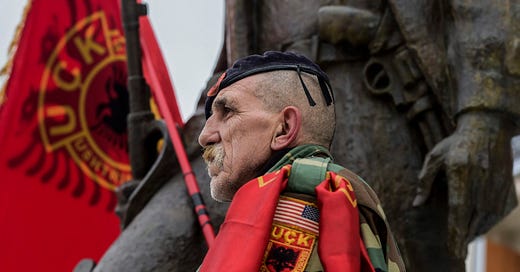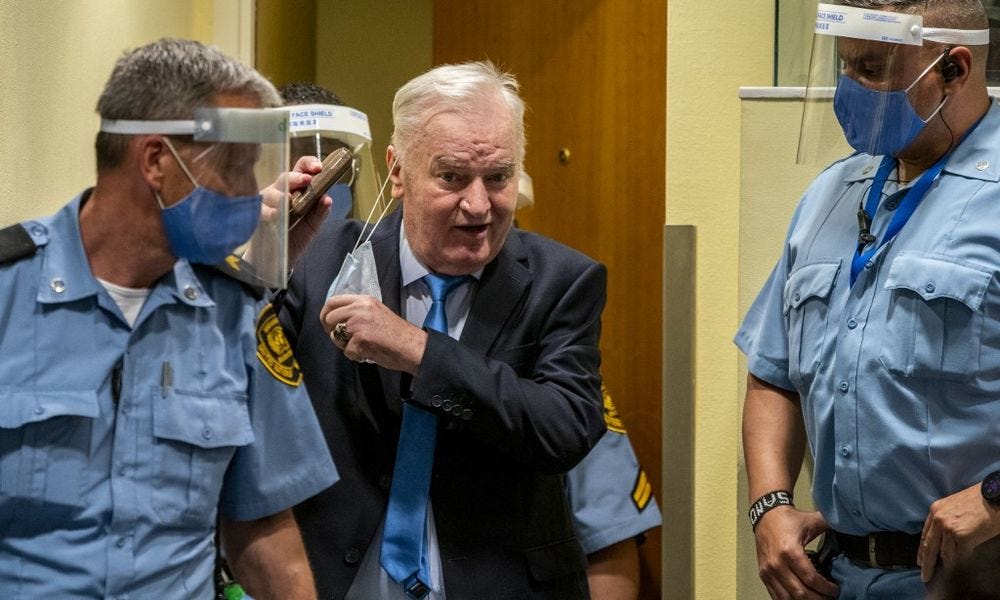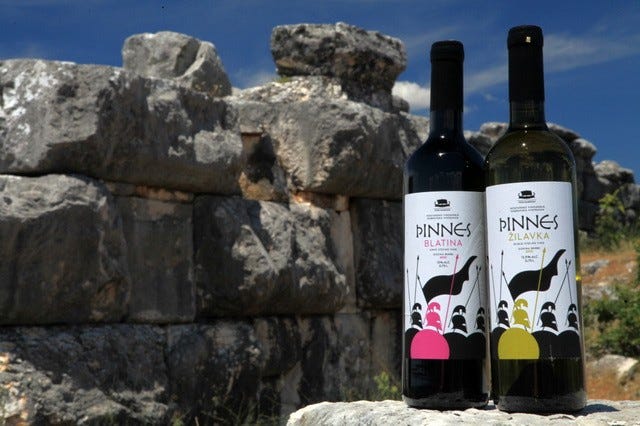S2E6. First among the last
The Kosovo Specialist Chambers began the war crimes trial against Salih Mustafa, former commander of the UÇK. From now on, it will be possible to complete the framework of the Yugoslav Wars
Hi,
welcome back to BarBalkans, the newsletter with blurred boundaries.
If you have been following this newsletter for some time, you have noticed that we have never addressed the issue of war crimes in the former Yugoslavia.
As some readers pointed out, I try to explain you why.
First of all. It is a topic that still cannot be analyzed from an historical perspective and that almost only hits the readers’ emotionality. It seems impossible to make a well-balanced argument (and often even a civilized discussion).
Secondly. Between 20 and 30 years have passed since those events. Even if it is crucial to know the dark past, we cannot crystalize that memory of the Western Balkans, as if nothing else happened afterwards. There is already a new generation that has known only peace and present Balkan societies deserve to be told.
Thirdly. Hasty ex-post evaluations are always more convenient than analyzing every single episode of the past. This approach does not often allow to accurately frame crimes, nor to better understand history through contextualized elements.
This is why BarBalkans - Podcast was born in parallel to this newsletter.
I decided to create a complex project. A “time machine” of the Yugoslav Wars, which month by month tells you what happened in the Balkans 30 years ago, on that precise month.
Including ethnic conflicts and war crimes, as if they were happening right now.
Every article with a podcast is edited in detail. It is published every second Wednesday of the month and it costs very little, for those who decide to support the whole BarBalkans project.
If you have been thinking about it for some time, or if you are now curious about it, you can subscribe by clicking here:
This is it.
And now I should also explain you why it makes sense to talk about war crimes today.
A new background
On Wednesday, September 15, The Kosovo Specialist Chambers in The Hague (Netherlands) began their first war crimes trial.
In the dock, Salih Mustafa, one of the former leaders of the Kosovo Liberation Army (UÇK). He is considered responsible for war crimes and crimes against humanity committed in April 1999.
Murders, torture, cruel treatment of prisoners and arbitrary detention.
Mustafa’s first statement was an attack on the Specialist Chambers: «I am not guilty of anything that this Gestapo is blaming me for».
Prosecutor Jack Smith stated that «today marks a milestone for this institution and our work».
In his opening statement, Smith accused the leadership of the Kosovo Liberation Army of «victimizing and brutalizing fellow Kosovo Albanians who had different opinions or were part of a rival ethnic Albanian political force».
A second prosecutor, Cezary Michalczuk, added that «the screams of the tortured were so loud they could be heard by the prisoners one floor below».
Mustafa’s indictment alleges that he was part of a «joint criminal enterprise, alongside certain other UÇK soldiers», which had a «shared common purpose to interrogate and mistreat detainees». Fifteen people will testify against him.
Mustafa is claimed to be the instigator and in some cases the perpetrator of tortures.
The detention compound was located in Zlas, a mountain near the capital city.
According to the prosecutors, prisoners were deprived of food, water and sanitation and were subjected to «beatings, burnings, electroshocks, death threats, humiliations and forced confessions».
The trial on case “Commander Cali” - Mustafa’s nom de guerre - comes a year after his arrest in Pristina and more than six years after Kosovo National Assembly created the Specialist Chambers, in August 2015.
The Specialist Chambers is part of Kosovo’s judicial system. It was established under pressure of the Western countries to prosecute former UÇK members for alleged crimes committed during the Kosovo War from 1998 to 2000.
However, it is located in the Netherlands and composed of international judges. There were fears of Pristina capacity to prosecute former UÇK leaders, to protect witnesses from intimidation and to avoid evidence pollution.
Some experts argue that this trial will set a precedent for all other cases involving former members of the Kosovar militia.
The Kosovo Specialist Chambers is a relatively newly-established court and its procedures have not been tested in a trial yet.
It was only in June 2020 that the Specialist Chambers and the Specialist Prosecutor’s Office filed charges for crimes against humanity and war crimes.
The question now is how the trial will be set up and what obstacles will face. There are no existing procedures to rely on and the defense will probably try to delay the trial as much as possible.
To be successful in a war crimes trial, the defense will have to refute all the prosecutor’s evidence. Probably the lawyers will try to prove that the defendant has no direct responsibility and dump them on people who are already dead.
The first-instance verdict in the Mustafa case is expected to be handed down by the end of 2022. But an appeal may ensure that the process continues beyond 2023.
In the meantime, a precedent will be set up for other trials in former UÇK leaders’ cases, that will be based on new grounds.
The names of the accused are well known in the Balkans: Kadri Vaseli, Rexhep Selimi, Jakup Krasniqi. And, above them all, Hashim Thaçi, the former president of Kosovo.
A glance on UÇK
The Ushtria Çlirimtare e Kosovës (UÇK), the Kosovo Liberation Army, was an ethnic Albanian separatist militia. It emerged in Kosovo in the late Eighties as an ensemble of groups led by self-proclaimed local leaders and bound by family ties.
During the Nineties they organized to separate Kosovo from the Socialist Federal Republic of Yugoslavia, clashing with Slobodan Milošević’s Serbia. It was considered a terrorist group until the dissolution of Yugoslavia.
Among the UÇK objectives there was also the creation of Greater Albania, the union of all ethnic Albanian peoples in a single State.
Following the escalation of Serbian repression in Kosovo, in mid-1998 the Kosovo Liberation Army was involved in an all-out war, outnumbered and outgunned.
When NATO forces intervened in Kosovo, the UÇK was officially disbanded (on September 20, 1999). Thousands of its members joined the Kosovo Security Force.
However, some UÇK-affiliated guerrilla groups continued violent struggles in southern Serbia (between 1999 and 2001) and northwestern Macedonia (2001).
In 2008, Kosovo unilaterally declared independence from Serbia and former UÇK leaders entered politics, holding high-level positions.
For example, Kadri Vaseli, former president of the National Assembly, Rexhep Selimi, former deputy of the leftist nationalist party Vetëvendosje, and Jakup Krasniqi, acting President of Kosovo between 2010 and 2011.
And Hashim Thaçi, elected head of state in 2016.
On November 5, 2020, Thaçi surprisingly resigned, following the confirmation of war crimes charges by the Kosovo Specialist Chambers.
Thaçi - together with Veseli, Selimi, Krasniqi and Mustafa - has been taken in custody at The Hague for almost a year, waiting for the beginning of his trial.
The former President of Kosovo has always rejected all charges, claiming that the war against Milošević’s Serbia was «a righteous war for freedom and independence of Kosovo» and that «no one can rewrite the history of Kosovo».
However, he will have to respond for about a hundred of killings, tortures, kidnappings, persecutions against Serbs, Roma and ethnic-Albanian political opponents.
Summing up war crimes trials
The history of war crimes trials began on May 25, 1993, when the International Criminal Tribunal for the former Yugoslavia was established as a body of the United Nations.
This was the first international war crimes Court established since the Nuremberg Trials.
After more than a thousand days of work, 161 trials and more than 5 thousand witnesses, the International Criminal Tribunal in the Hague ceased to exist on December 31, 2017.
Concerning the 154 completed trials, there were 83 final convictions, 19 dismissals, in 37 cases the charges were dropped or the defendants died before the final judgment, 13 were referred to national Courts and 2 must await retrial at the International Residual Mechanism for Criminal Tribunals.
This is the body specifically established to conclude the activities of the Criminal Court after its dissolution.
Ratko Mladić’s case is the most recent. He is a former Serbian general, sentenced definitively to life imprisonment on June 8 for genocide, war crimes and crimes against humanity in Bosnia.
He is called the “Executioner of Srebrenica” and is responsible for the siege of Sarajevo.
Not only Mladić, but a long series of defendants from the ranks of all warring parties: Serbs, Croats, Serbs of Croatia, Serbs of Bosnia, Croats of Bosnia, Bosniaks, Albanians of Kosovo, Montenegrins, Macedonians.
Among the most famous, we have to mention:
Slobodan Milošević, President of Serbia from 1991 to 1997 (then of Yugoslavia until 2000). He was handed over to the International Criminal Court in 2001, but he died in in The Hague prison before the sentence, because of a heart attack on the night of March 11, 2006.
Radovan Karadžić, former President of Republika Srpska, sentenced to life imprisonment on 2019 appeal for the Srebrenica genocide and ethnic cleansing campaigns in Bosnia.
Milan Babić, first President of the self-proclaimed Republic of Serbian Krajina, sentenced to 13 years in prison, because he decided to cooperate. He was found dead in his cell on March 6, 2006, after testifying against Milan Martić.
Milan Martić, leader of the Serbs of Croatia and last President of the Republic of Serbian Krajina, surrendered to the Court on May 5, 2002 after seven years of absconding. In 2008, he was sentenced definitively to 35 years in prison.
Željko Ražnatović, leader of the paramilitary group “Arkan’s Tigers”, was indicted for genocide and ethnic cleansing in Croatia and Bosnia. He was never brought to trial because he was murdered on January 15, 2000 in a hotel lobby in Belgrade.
Biljana Plavšić, former President of Republika Srpska and the only woman prosecuted by the International Criminal Tribunal. She was sentenced to 11 years in prison in 2003 for war crimes and crimes against humanity, but she was released in 2009 for good behavior.
Slobodan Praljak, Bosnian-Croat general sentenced to 20 years in prison in 2017 for war crimes during the conflict against Bosniaks. He is remembered for committing suicide by drinking a vial of cyanide in the courtroom, after his conviction was upheld on appeal.
Pit stop. Sittin’ at the BarBalkans
We have reached the end of this piece of road.
In order to sweep away the gloom, at our bar, the BarBalkans, there is a wine which tastes of reconciliation. A project by Bosnian winery Vino-Daorson.
It is a wine made from native Bosnia and Herzegovina grapes, Žilavka and Blatina, and it is a revival of a local two-thousand-year wine tradition.
But what draws attention is recent history and also the future it envisions.
The winery’s founder is Alija Lizde, who was imprisoned in a Bosnian-Croat police camp in 1993 - for being a Muslim - and then was a witness in war crimes trials against former Bosnian-Croat leaders.
Nevertheless, Lizde now runs a small cooperative in southern Bosnia and Herzegovina. He works there with six Croats and one Serb to overcome the horrors of the war that tore the countries of the former Yugoslavia apart.
Working in the vineyard has become a kind of therapy, but also a demonstration of coexistence with those who were on the other side of the fence for years.
The eight workers have “restored” a miniature Yugoslavia in southern Bosnia, facing together a painful past, when they were enemies without even knowing why.
The Vino-Daorson winery project began in 2009 and is funded by the Italian Ministry of Foreign Affairs and by non-governmental organization CEFA.
In 2010, the first grapes were harvested from the vineyards in Mostar, and about 20 thousand liters of wine were produced, including white Pinnes Žilavka and red Pinnes Blatina.
In April 2011, it was presented at Vinitaly (the international wine exposition held in Verona, Italy), where it raised great interest for its political and social message.
On that occasion, in an interview for Reuters, Lizde explained:
«All of us have suffered from the war. Some people will understand quickly that it is possible to work together. Others, who may have suffered so much, will probably take longer. But I think that ours can be a very good example of reconciliation».
Let’s continue the BarBalkans journey. We will meet again in a week, for the 7th stop.
A big hug and have a good journey!
As always, I thank you for getting this far with me.
Here you can find all the previous newsletters. If you found today’s episode interesting, I suggest you this read:
BarBalkans is on Facebook, Twitter and Instagram. The updated archive is on Linktree.










